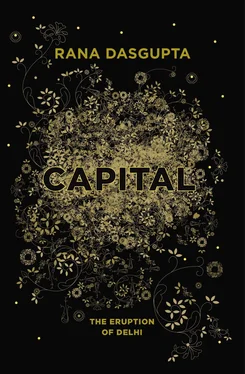“I did not sleep with these girls, I just humiliated them. If any of my friends wanted a prostitute, I would arrange it for them. I would do the deal with the guy and I would tell him that we had to be able to do anything to the girl, with any number of people, or the deal was off. I would go and pick up the girl and I would tell her to suck me in the car for free. It was all about humiliation: I came in her mouth not for pleasure but to humiliate her. When I delivered her to my friends we would sit around drinking whisky and I would ask her to strip in front of everyone and to do all kinds of humiliating things. To put money in her cunt.
“Because I did everything for my wife. I gave her everything she wanted. I gave up my business in the US to be with her. I gave her a Toyota SUV just because I wanted her to have it. I gave her the respect of society, being the wife of such a rich family of India. I gave her all that and she screwed me. What was I supposed to do?”
I ask Anil if he had girlfriends before his wife.
“I wouldn’t say I was a virgin when I got married. But I only had girlfriends outside India, never in India. I never touched an Indian girl before I got married.”
“The prostitutes. Were they Indian?”
“Yes.”
Anil is preoccupied by boundaries, and by the purity of what lies within. It was acceptable for him to have pre-marital sex outside India, but not to corrupt the Indian woman. It was possible to do business with both American corporations and ultra-conservative Islamists — for he had made some of his money from deals with the Taliban in Afghanistan — but he had to keep his body pure of meat and alcohol. In getting married, however, Anil had relaxed his boundaries. He had opened up his intimate world to an outsider, and in return he had been utterly undone. He had found that the pure Indian woman of his imagination not only had a sexual appetite in excess of his own, but that she was capable of perfidy. In the resulting emotional chaos he began both to defile his own body and to extend a ceremonial kind of sadism towards Indian women.
He tells all of this quite naturally, and without any kind of apology. He does not seem to feel that he is morally compromised. In fact he lectures lengthily, even tediously, about morals.
“You should not have desires,” he says. “You should make yourself enjoy what life has given you. I do meditation every day to control my desires. For instance, I could spend my time complaining that I was in Delhi and wishing I was somewhere else, but that would just make me unhappy. I hate the fact that Delhi has no respect for women. But you have to be content where you are. People are too full of desires. Women, especially. Women don’t know how to control their desires.
“True happiness is about sacrifice. Love is about sacrifice. When you’re in love with a person, you just want to sacrifice for that person. Like Radha did for Lord Krishna. Like Sita did for Rama. If someone asks for your life, give your life. If blood, give blood. Like Mahatma Gandhi said, if someone slaps you on one cheek, offer them the other cheek. But the problem is today, people don’t have that much patience.
“Now I’m trying to improve my karma. I’ve stopped the business with prostitutes. I’ve given up meat. When your karma is good, you’ll automatically bump into people who are profitable to you. But when it is bad, you meet people who will fleece you. So I’m being a good person, trying to help people however I can. For instance, my favourite masseur came to the house. He wanted socks. So I gave him my socks. He’s a poor man: he comes every day and he gives me a full-body massage. Tomorrow if he wants a shirt, I’ll give him a shirt. You do whatever you can. Goodness is in circulation like money. The amount of good and bad in the world always remains the same. It neither increases nor decreases, it only changes hands. It is never yours: you are only the custodian. If you don’t use it, someone else will take it. If I do something good, I take the credit from you. You get minus, I get plus. It’s like a double credit. It is up to you to get as much as you can from other people. The only way to get it is to take it from other people because it is like money: it circulates with people. When I give socks to my masseur, I take his goodness from him.”
It is still subdued in the bar at this early hour of the evening, so it is difficult to ignore the man who shouts out to someone in the opposite corner, asking if he is going tonight to a dinner hosted by a prominent industrialist. He drops the name twice, loudly, and an elderly Sikh man stands up to protest.
“Cool it!” he calls out authoritatively. “We’re all invited to the same dinner. We don’t need to hear about it from you. If you want to come in here, learn how to behave!”
My heart does not dwell in this ravaged land
Who can be happy in an unstable world?
…
Tell these regrets to go dwell somewhere else
Where is the space in this scorched heart?
— From a poem written in his final exile by Bahadur Shah Zafar, last Mughal emperor 14
If Delhi was so particularly fearful of a loss of values, it was partly because the region in which it lay had had its values destroyed many, many times. For centuries it had lain in the path of invaders from the north and west who were drawn by the riches of the sub-continent, a fact which had lent fragility to all things, tangible and intangible. A saying is still preserved in some Punjabi families: “Jo khadda pitta apnaa, baki shahi daa” (“What is in your stomach is yours; the rest belongs to the invader”). Assume the worst, went the thinking, the better to survive: wealth will always be stolen away; just consume whatever you can so at least that part is not lost too. For many people, even those who profited from it, global capitalism was another of these foreign invasions, and while it did have people consuming madly, this did not quell the anxiety of loss.
It is common to talk about Delhi as an ancient city, beginning with its supposed origins as the city of Indraprastha described in the Mahabharata — but it is not strictly that. There is little physical continuity between the many cities of Delhi: none was incorporated organically into the next. Cities were sacked by invaders and left uninhabitable, or they ran out of water immediately after their construction and had to be abandoned — and stones were then carted from each of these settlements to build the next. Each time a new power came to this place, it shifted ground and built afresh, draining the last life out of what existed before and leaving it to decay. This singular discontent with the already existing did not end in modern times: the British built ‘new Delhi’ in the wilderness, and global capital started from scratch with Gurgaon. The spirit of this place has always been staccato, and full of fractures.
The greatest period of stability came under the Mughals, a dynasty originally from central Asia, whose legendary wealth and magnificence reached their height in the seventeenth century. It was at this time that the emperor Shah Jahan removed his capital from Agra and brought it to Delhi, where he built a new metropolis on the banks of the Yamuna river. Laid out over the ruins of a city sacked in the fourteenth century, this glistening paradise of domes and gardens sprang up, stupefyingly, in less than one decade. Nowadays this city — Shahjahanabad — is called ‘Old Delhi’, to distinguish it from ‘New Delhi’, the city built by the British after they moved their capital here in 1911; but in the days of its magnificence, it seemed that obsolescence could never visit such dewy bowers, such inordinate splendour, such implausible avenues, with their rose-water fountains, exquisite merchandise and royal processions.
Читать дальше











